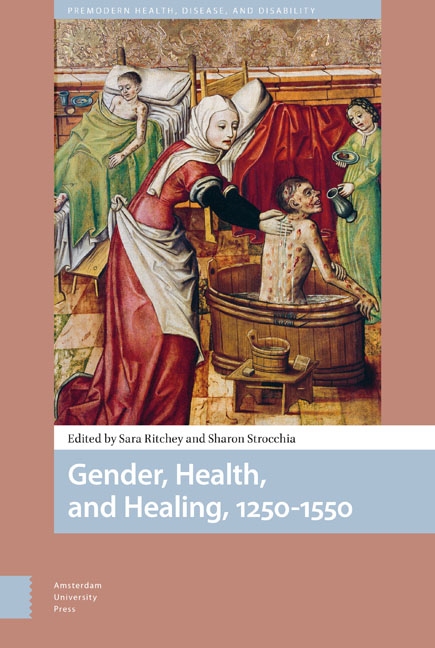Book contents
- Frontmatter
- Contents
- List of Figures and Tables
- Acknowledgments
- Abbreviations
- Introduction: Gendering Medieval Health and Healing: New Sources, New Perspectives
- Part 1 Sources of Religious Healing
- 1 Caring by the Hours: The Psalter as a Gendered Healthcare Technology
- 2 Female Saints as Agents of Female Healing: Gendered Practices and Patronage in the Cult of St. Cunigunde
- Part 2 Producing and Transmitting Medical Knowledge
- 3 Blood, Milk, and Breastbleeding: The Humoral Economy of Women's Bodies in Medieval Medicine
- 4 Care of the Breast in the Late Middle Ages: The Tractatus de passionibus mamillarum
- 5 Household Medicine for a Renaissance Court: Caterina Sforza's Ricettario Reconsidered
- 6 Understanding/Controlling the Female Body in Ten Recipes: Print and the Dissemination of Medical Knowledge about Women in the Early Sixteenth Century
- Part 3 Infirmity and Care
- 7 Ubi non est mulier, ingemiscit egens?: Gendered Perceptions of Care from the Thirteenth to Sixteenth Centuries
- 8 Domestic Care in the Sixteenth Century: Expectations, Experiences, and Practices from a Gendered Perspective
- 9 Bathtubs as a Healing Approach in Fifteenth-Century Ottoman Medicine
- Part 4 (In)fertility and Reproduction
- 10 Gender, Old Age, and the Infertile Body in Medieval Medicine
- 11 Gender Segregation and the Possibility of Arabo-Galenic Gynecological Practice in the Medieval Islamic World
- Afterword: Healing Women and Women Healers
- Contributors
- Index
4 - Care of the Breast in the Late Middle Ages: The Tractatus de passionibus mamillarum
Published online by Cambridge University Press: 23 June 2021
- Frontmatter
- Contents
- List of Figures and Tables
- Acknowledgments
- Abbreviations
- Introduction: Gendering Medieval Health and Healing: New Sources, New Perspectives
- Part 1 Sources of Religious Healing
- 1 Caring by the Hours: The Psalter as a Gendered Healthcare Technology
- 2 Female Saints as Agents of Female Healing: Gendered Practices and Patronage in the Cult of St. Cunigunde
- Part 2 Producing and Transmitting Medical Knowledge
- 3 Blood, Milk, and Breastbleeding: The Humoral Economy of Women's Bodies in Medieval Medicine
- 4 Care of the Breast in the Late Middle Ages: The Tractatus de passionibus mamillarum
- 5 Household Medicine for a Renaissance Court: Caterina Sforza's Ricettario Reconsidered
- 6 Understanding/Controlling the Female Body in Ten Recipes: Print and the Dissemination of Medical Knowledge about Women in the Early Sixteenth Century
- Part 3 Infirmity and Care
- 7 Ubi non est mulier, ingemiscit egens?: Gendered Perceptions of Care from the Thirteenth to Sixteenth Centuries
- 8 Domestic Care in the Sixteenth Century: Expectations, Experiences, and Practices from a Gendered Perspective
- 9 Bathtubs as a Healing Approach in Fifteenth-Century Ottoman Medicine
- Part 4 (In)fertility and Reproduction
- 10 Gender, Old Age, and the Infertile Body in Medieval Medicine
- 11 Gender Segregation and the Possibility of Arabo-Galenic Gynecological Practice in the Medieval Islamic World
- Afterword: Healing Women and Women Healers
- Contributors
- Index
Summary
Abstract
The Tractatus de passionibus mamillarum, a short treatise written in fifteenth-century Italy, details treatments for women who experienced painful breast engorgement while lactating. It is primarily a translation of a chapter concerning the breast taken from the Lilium medicine of the Montpellier physician, Bernard de Gordon. The author of the Tractatus, however, eliminates most of Bernard's commentary. The treatments are simple combinations of herbs, minerals, and liquids meant to be applied to the skin as plasters or poultices. This essay contextualizes the Tractatus within the historiography and literature of breastfeeding and provides a brief transcription and translation of its original recipe. It argues that the Tractatus represents a ‘hybrid’ form of healthcare and body knowledge that bridged household and academy.
Keywords: breastfeeding, recipe books, breast disease, household medicine, Bernard de Gordon
First of all, note that there are many and different problems of women’s breasts, which mostly cause a decrease in milk, whether by excess, or by too much milk, or by coagulation, that is curdled milk, which cause the breast swelling and pain. In addition, hot apostemes and cold apostemes and nodes and glands and hardness and ulcers and corrosion and fistulae and excessive growth are formed in the breasts.
− Tractatus de passionibus mamillarum, Venice, Biblioteca Nazionale Marciana, Latin VII 40, fol. 19r
The Tractatus de passionibus mamillarum appears in two fifteenth-century manuscripts and addresses an unusual topic: care of the breast, especially the nursing breast. It is largely extracted from the Lilium medicine of Bernard de Gordon (c. 1270-1330), a practising physician who taught at the University of Montpellier. The Tractatus is an Italian adaptation of his work, interspersing some original material and the work of other writers. In choosing particular paragraphs from Bernard's work, the anonymous translator avoided technical information related to the humors and medical philosophy. He also added brief, practical information from the work of other writers, such as Ibn Sīnā and Ibn Rushd. The treatise, comprising four folios in total, contains twenty-seven recipes designed to be applied topically to the skin, but presents no remedies to be taken internally. As a result, the Tractatus appears to have been written for everyday practical use by readers who possessed little or no formal medical learning.
- Type
- Chapter
- Information
- Gender, Health, and Healing, 1250–1550 , pp. 119 - 138Publisher: Amsterdam University PressPrint publication year: 2020



